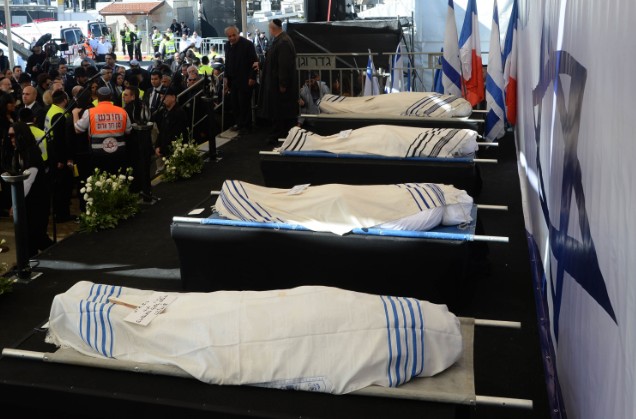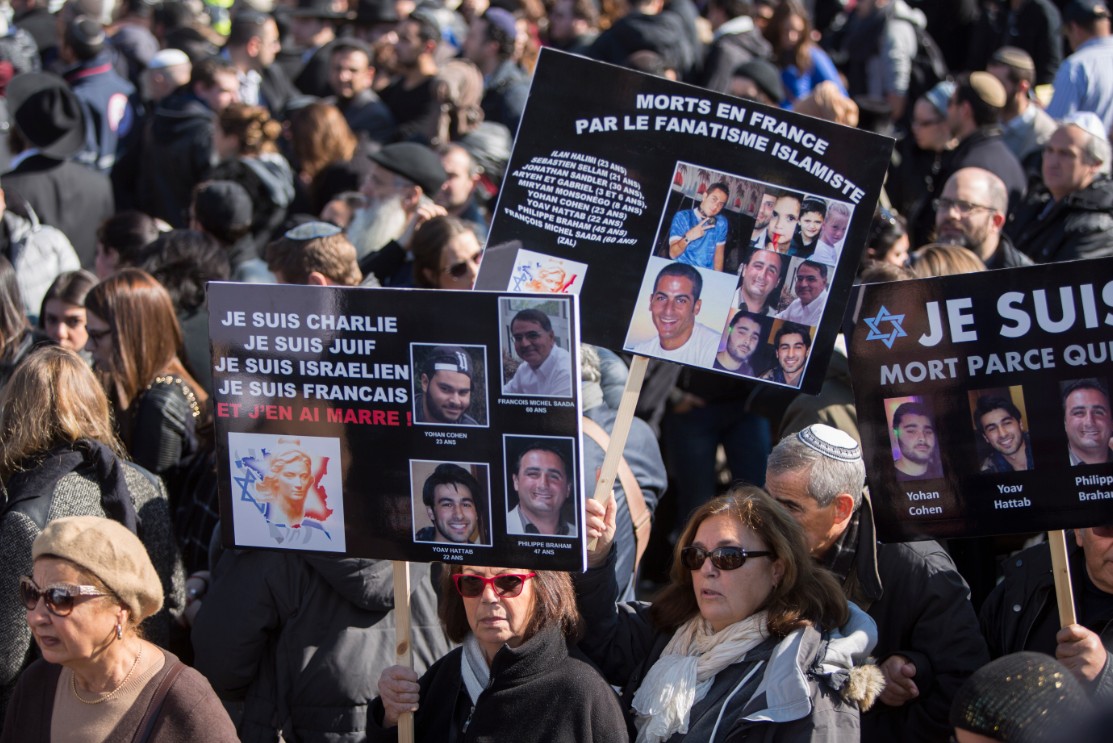Why Are We Constantly Being Killed? A Letter to French Jewry
A comforting letter sent by Rabbi Pinchas Friedman from Jerusalem to his followers in France. The letter provides insights into the pressing question: Why are Jews constantly being killed?

Less than two months have passed since the lower Jerusalem was struck with shock, as two despicable murderers from the seed of Ishmael entered a synagogue and cruelly murdered four Jews, scholars, holy and pure, during the Shacharit prayer, adorned with tallit and tefillin.
And here we stand again, shattered, with broken hearts, before the dreadful scene on French soil where a vile soul, a Jew-hater, cold-bloodedly murdered four pure souls, holy Jews, on a Friday afternoon, as they went shopping in honor of the holy Shabbat. Instead of returning home with delicacies for Shabbat to fulfill (Isaiah 58:13): "and call the Shabbat a delight," their pure souls stormed to the heavens after being shot for no sin of theirs, solely for being Jews, descendants of Abraham, Isaac, and Jacob.
 The bodies of the four Jewish victims in the Paris attack (Photo: Flash 90)
The bodies of the four Jewish victims in the Paris attack (Photo: Flash 90)The words of the Shacharit prayer, in which Jews worldwide pour their hearts out to their Father in Heaven twice a week, on Torah reading days, Monday and Thursday, take on a special significance after such a hard event: "Look down from heaven and behold, for we have become a mockery and scorn among the nations. We are considered as sheep led to the slaughter, to kill and destroy, and for beating and humiliation. Yet your name we have not forgotten; please do not forget us."
We stand helpless, searching for words to express the immense pain weighing on every Jew's heart, eagerly searching for a few words of comfort and strength after the great disaster that befell our people. We marvel anew each time, wondering how to cope with such a terrible and severe event, what to answer the dreadful question already asked by David, King of Israel (Psalms 79:10): "Why should the nations say, 'Where is their God?' and our God is in heaven doing whatever He pleases."
"Behold the blood of the covenant that the Lord made with you"
It is always good and appropriate to perform self-examination, especially after such a horrible event. Everyone must strengthen their commitment to Torah study and commandment observance, but this is not the time to look for sins and crimes that supposedly caused this great disaster. This task is entrusted only to the great sages of Israel, the leaders of the generation, who live long and good lives, in the sense of (Psalms 25:14): "The secret of the Lord is with those who fear Him, and to them will He reveal His covenant." We see that they shy away from speaking about it. Apparently, there is no sin in the world justifying such atrocious murders of Jews just for being Jews.
What is incumbent upon us is to realize that such horrible disasters involving Jews from the chosen nation killed for the sanctification of the name have accompanied us as Jews since our patriarch Abraham, the first Jew in the world, risked his life for the sanctification of the name when Nimrod threw him into the fiery furnace because he did not wish to refute the unity of God's name. Likewise, Isaac, his son, was prepared to be sacrificed on the altar during the binding, thereby setting a seal for his descendants, the children of Israel, for eternity. To be a Jew is to be a part of God's people, one must be ready and willing to be burned and killed for the sanctification of the name.
This seal of self-sacrifice was greatly reinforced in anticipation of the giving of the Torah when Moses our teacher enacted the "blood of the covenant" between Hashem and Israel, by dividing the blood of offerings into two exact halves. Half the blood was sprinkled on the altar in God's share, and half the blood was sprinkled on Israel as it is written (Exodus 24:5):
"And he sent the young men of the children of Israel, who offered burnt offerings and sacrificed offerings of peace to Hashem. Then Moses took half of the blood and put it in basins, and the half of the blood he sprinkled on the altar. Then he took the book of the covenant and read in the hearing of the people. They said, 'All that Hashem has spoken we will do, and we will hear.' And Moses took the blood and sprinkled it on the people and said, 'Behold the blood of the covenant which Hashem has made with you according to all these words.'"
The "Ohavei Yisrael" by the holy Rabbi of Apta, ztz"l (Parshat Shekalim), explains the significance in the sprinkling of the blood, half on the altar and half on Israel:
"Thus it is the way of people who enter into a covenant together, and they become as one flesh and one spirit. Thus, each is ready to give his life for his fellow, and so their blood becomes mixed together, for the blood is the soul, the essence of spiritual power. As Abarbanel wrote in the book 'Matzmiach Yeshuah,' the root of the matter of covenant making is the customary practice of the world that when two kings make a covenant to enhance love between them and to be each other’s help and support, they each drink a cup of wine into which each of them has dipped his finger, dropping a small amount of blood into the cup. Then each drinks the cup mixed with the other’s blood. This act symbolizes that they mix their blood, which is their life, to become one at heart and be in unity; each obligated to give his blood and risk his life for his fellow. This is what covenant-making is.
And indeed, the heavenly kingdom mirrors the earthly kingdom, and to symbolize this Moses our teacher, peace be upon him, master of all prophets, took half of the blood into the basins... and half of the blood he sprinkled on the altar... and from the blood in the basins, he sprinkled it on the people, symbolizing that their powers are mixed together, that Israel has the power for self-sacrifice for the sanctification of His blessed and exalted name. This is the covenant, and he proclaimed, 'Behold the blood of the covenant which Hashem has made with you,' to be with you in complete union and in the mystery of one."
 The funeral of the murder victims on Har HaMenuchot (Photo: Flash 90)
The funeral of the murder victims on Har HaMenuchot (Photo: Flash 90)"I passed over you and saw you wallowing in your blood"
The blood covenant that we made with Hashem at the time of the giving of the Torah is an inseparable part of our being the chosen nation, ready to risk our lives for the sanctification of the name, even during our exiles among the nations of the world. Standing the test of this blood covenant during the exiles strengthens the bond between us and Hashem, preparing us for the complete redemption, when Hashem will reconnect with us in a covenant of life instead of a blood covenant, as it is written (Jeremiah 31:30): "Behold, days are coming, says Hashem, when I will make a new covenant with the house of Israel and with the house of Judah... for this is the covenant that I will make with the house of Israel after those days, says Hashem, I will put my Torah in their inward parts, and write it on their hearts, and will be their God and they will be my people."
In these challenging times, we must sharpen all our spiritual senses to hear the voice of Hashem like a fire, reverberating through the world (Ezekiel 16:6): "I passed over you and saw you wallowing in your blood, and I said to you in your blood, live, and I said to you in your blood, live." This reveals to us that when Jewish blood is spilled like water, He does not hide His face from us but participates in our sorrow and passes over us to see how we wallow in the blood of killings and murders that have been our portion over the thousands of years of exile, in the decrees of Tach and Tat, in the many pogroms in all the lands of the nations, in the great destruction during the years of destruction and rage when six million of our holy ones were burned alive in gas chambers. To this Hashem strengthens us: "And I said to you in your blood, live, and I said to you in your blood, live" – this "blood covenant" is preparation for the "eternal life covenant" of all Israel in the forthcoming redemption.
Likewise, we must remember and repeat the rules of war. Every nation, no matter how strong, knows that there is no victory without casualties when going to war. We, the children of Israel, are in a constant battle, a battle for our existence as God's people, people of Torah and commandments. Our war against the nations of the world is not fought with bombs and bullets, tanks, and planes; it is fought in the most challenging times by insisting on strengthening the bond and the covenant between us and Hashem, devoting ourselves even more to Torah and divine service, maintaining kashrut more rigorously, and observing all commandments of the Torah as in days of old, without any change even a jot.
The wicked nations, enemies of Israel, envy us and cannot bear to see how happy and fulfilled we are as Jews connected to Torah and commandments. So occasionally, they manage to put us to the test by shedding our blood, hoping maybe it will deter us from continuing to be proud Jews, maybe they will succeed in driving a wedge between us and Hashem.
Thus, the sacred duty imposed on us at this hour is to follow the path our holy ancestors walked at all times, stand the test, and say to the murderers: That which you have imagined in your evil thoughts shall not be; the blood covenant we made with Hashem thousands of years ago when we received the Torah will not be broken. Together, we all as one person with one heart proclaim openly to our Father in heaven: "We were considered as sheep led to the slaughter, to kill and destroy, and for beating and humiliation. Yet your name we have not forgotten; please do not forget us."
We must lift our eyes and cry out loudly enough to pierce all the gates of heaven (Psalms 44:21): "If we had forgotten the name of our God and spread our hands to a strange god, would not God search this out? For he knows the secrets of the heart. Surely, we are killed all day long for you, we are considered sheep for the slaughter. Awake, why do you sleep, Lord? Arise, do not reject us forever. Why do you hide your face and forget our affliction and oppression? For our soul is bowed down to the dust, our belly clings to the earth. Rise up, be our help, and redeem us for the sake of your loving kindness."
We conclude with the testimony of our sages of blessed memory (Baba Batra 10b) about the holy and pure souls of those who were murdered for the sanctification of the name: "None can stand in their place." It is no coincidence they were killed for the sanctification of the name on a Friday close to the holy Shabbat, a hint that they are ready and prepared for the world to come compared to Shabbat, as Hashem will say to the nations (Avodah Zarah 3): "Fools of the world, the one who labored on the eve of Shabbat will eat on Shabbat." May their souls be bound in the bond of life until the verse as written (Isaiah 26:19): "Your dead shall live; their bodies shall rise. Awake and sing, you who dwell in the dust, for your dew is like the dew of the morning, and the earth shall bring forth its dead."

